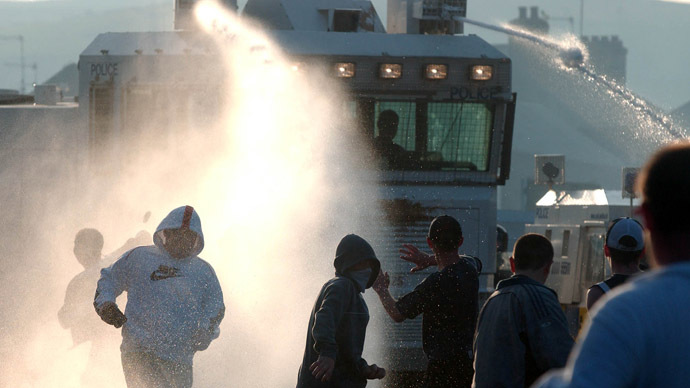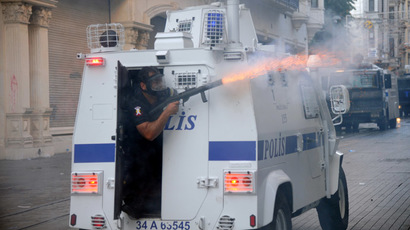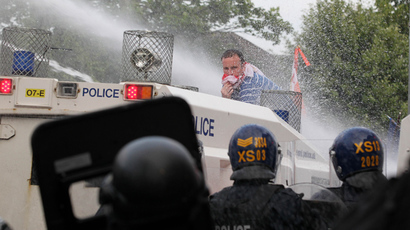UK police apply pressure on government for water cannons

Police chief constables in the UK are pressing the home secretary, Theresa May, to sanction the controversial deployment of water cannons across England and Wales in anticipation of ongoing protests against austerity in the country.
The Association of Chief Police Officers has stated that it will be necessary to use the harsh measures in order to control demonstrations which could be sparked by “ongoing and potential future austerity measures.”
In a document prepared on January 8 and newly released, when the plans first came to light, the ACPO recognized that “high-profile public disorder in recent years has led to a revision of the national public order framework.”
They added that “as part of this review, the need for water cannon to be available to support public order and public safety operations in England and Wales has been revisited.”
David Shaw, a West Mercia police chief constable who has been heading up a national Acpo/Home Office project that was set up in the aftermath of the 2011 riots, cited three incidents over the past ten years when police commanders would have seriously weighed up the option of deploying the water cannon, had the possibility been available – the Countryside Alliance demonstration in Parliament Square in 2010, the Gaza demonstrations outside the Israeli embassy in 2008/2009 and even “potentially” the student protests of 2010.
On January 6, London Mayor, Boris Johnson, wrote a letter to May, stating that the 2011 riots prompted him to consider their use.
“Following the disorder in August 2011, both the Metropolitan police service and Her Majesty's Inspectorate of Constabulary stated that there are some circumstances where water cannon may be of use in future,” he wrote. Critics warned at the time that it would stifle the public’s democratic right to protest and was a manifestation of a further step towards the militarization of the police forces.
However, the ACPO report described the controversial high pressure riot-control device as potentially “a national asset”, while still outlining the three ways in which they might cause danger or injury to the public.
It noted ‘primary’ injuries caused by the stream of water impacting the body, followed by secondary possible injuries from debris or other obstacles on the street. Thirdly, it also identified the possibility of injuries being caused by other objects hitting the body.
The report mentions Northern Ireland where the deployment of water cannons have previously been used. “The Police Service of Northern Ireland currently has 6 water cannons. In recent years, all six cannons have been deployed simultaneously in response to disorder,” stated the report.
APCO has previously been told that they are unable to use the same cannons to suppress unrest in England or Wales. “Deployment in England and Wales would be based on tactics employed over the past decade in Northern Ireland,” it added.
The costs of introducing it to the UK were also briefly touched upon: “Typically water cannons cost from £600k to £1 million. It is anticipated that a cannon would last between 25 and 30 years,” it stated.
It also stated that May is expected to be “approached in early 2014 in respect of water cannon authorization.” It is likely that Johnson’s initial proposal is to be discussed in full next Wednesday – despite May’s rejections of calls for its deployment in 2011 at the height of the riots.
“The Deputy Mayor will be questioned by Assembly Members on water cannon at the Police and Crime Committee on 30 January 2014, 1000-1200 at City Hall,” stated London.gov.uk.














